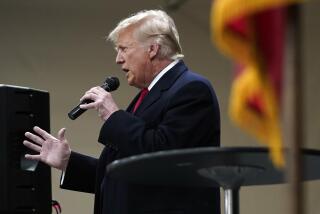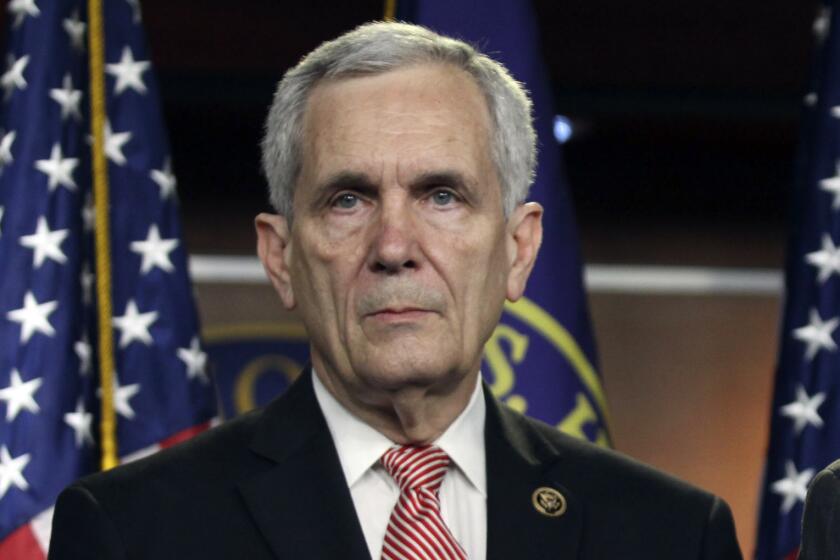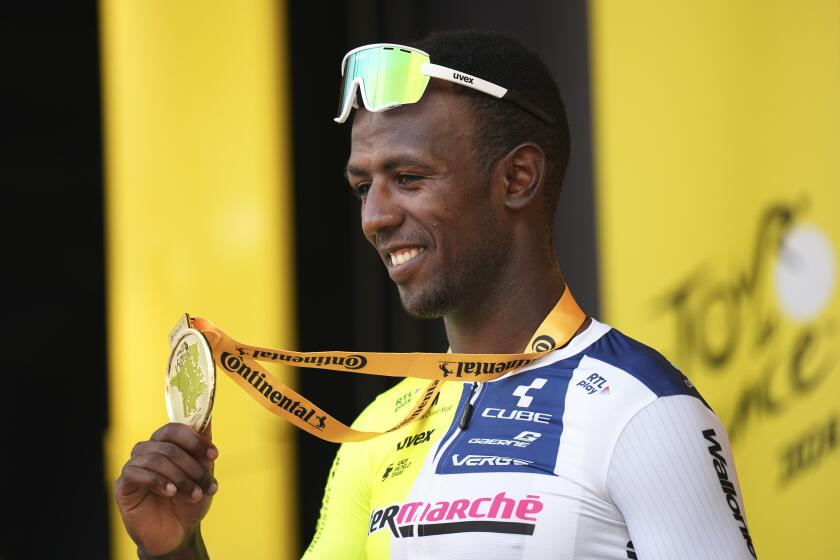Evangelicals hold sway in Iowa caucuses
Nationally, the presidential campaign is being waged on the issues of jobs and the economy, but here in Iowa, an entirely different battle is unfolding.
In the competition for the highly influential evangelical vote, abortion and gay rights are at the forefront as Republican candidates try to assure voters of their own convictions and sow doubts about those of their rivals.
Candidates are working under the radar in private meetings with influential pastors, and occasionally taking the fight public. Several this week pounced on Herman Cain’s statement that although he opposes abortion under any circumstance, such decisions should be left to the mother, not the government.
“A lot of behind-the-scenes wooing and romancing is going on,” said Ralph Reed, chairman of the Faith and Freedom Coalition, which will host a forum Saturday that will be attended by nearly every Republican candidate. “The reason why is fairly obvious: If someone underperforms among that constituency, arithmetically, it becomes very difficult to end up in the top one or two places” in Iowa.
About 1,000 evangelical voters are expected to attend the forum, and an additional 2,500 are expected at a pre-Thanksgiving round-table in Des Moines held by the Family Leader, an umbrella group of socially conservative organizations that banded together for the 2012 campaign.
In 2008, as many as 60% of caucusgoers here identified themselves as evangelical, and they united behind former Arkansas Gov. Mike Huckabee to give him a surprise first-place finish over establishment candidate Mitt Romney.
“When that group coalesces around somebody, take all the [other] endorsements and fundraising advantage and flush them down the toilet,” said Steve Deace, a conservative radio host. “We don’t have an obvious champion this time, at least not now.”
That’s because this year there are so many options.
Rep. Michele Bachmann of Minnesota has been the most aggressive, racking up the endorsements of more than 100 pastors and speaking at churches large and small about the moment she accepted Jesus as her savior. Her candidacy is predicated almost entirely on doing well in Iowa.
Former Pennsylvania Sen. Rick Santorum has been making unannounced visits to evangelical congregations in addition to attending his own Catholic services when he is in the state. Santorum spent hours talking to voters at a conference earlier this year on home-schooling, another caucus powerhouse group that includes evangelical voters.
Unlike his run four years ago, Texas Rep. Ron Paul is emphasizing his opposition to abortion. His speech at the Ames Straw Poll in August and a radio ad he began airing here last week focused on the issue.
Texas Gov. Rick Perry and businessman Cain are also natural fits for this group, though they have not yet made as many moves to court them. Perry’s staff has begun reaching out to key leaders — he will meet with Family Leader President Bob Vander Plaats in coming weeks.
These candidates largely share the same social platforms, opposing abortion rights and gay marriage. As a result, much of the fight is about degrees of commitment.
Cain’s remarks about abortion are the most recent evidence. Less than 24 hours after the former Godfather’s Pizza executive made the comments to CNN, Santorum blasted them in an email to supporters titled “Floored.”
“That means that while he believes it is a life, he doesn’t consider it a life worth fighting for,” Santorum said. (Cain later said he misunderstood the question).
Earlier in the campaign, Santorum called out Cain, Bachmann and Perry for saying they opposed gay marriage but respected states’ rights to control it. And Bachmann and Santorum have loudly criticized Perry for backing vaccinations for young girls against a sexually transmitted disease, a decision they said should be left to parents.
Any veering from socially conservative orthodoxy could cause problems for the candidates.
“Voters will be looking; they’ll be thinking who has an unquestioned commitment to life,” said Rep. Steve King, an influential Iowa conservative who has not yet endorsed a candidate in the race.
In interviews at a mega-church in Waukee and campaign events around the state, evangelical voters most frequently brought up Bachmann’s name.
“I’m a Christian. I don’t really like total separation of church and state. I think the country was founded on a lot of Christian principles that we’re losing,” Denny Wessels, 75, said after seeing Bachmann speak at a Fort Dodge coffee shop. “She’s pretty all right in everything she says.”
Voters also mentioned Cain and Perry as intriguing prospects.
The one name that rarely arises, except with derision, is Mitt Romney, who is not attending Saturday’s forum. Most were skeptical about the former Massachusetts governor’s change in positions over the years, notably on abortion, which he now opposes. One said his Mormon faith was a concern.
“I don’t think Mormonism is the same as Christianity,” said Kathy Somers, 41, of Atlantic, before adding that she was turned off by his record as governor. “I question his conservativeness.”
The irony: If evangelical voters remain splintered, Romney may be the greatest beneficiary.
“Quite frankly, they could fracture, and if they fracture, you’re going to see a person like Mitt Romney walk out of Iowa with a victory,” Vander Plaats said.
More to Read
Start your day right
Sign up for Essential California for news, features and recommendations from the L.A. Times and beyond in your inbox six days a week.
You may occasionally receive promotional content from the Los Angeles Times.







